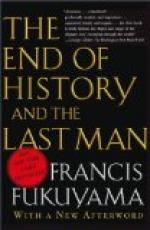|
This section contains 1,885 words (approx. 7 pages at 300 words per page) |

|
SOURCE: “Cleopatra's Nose,” in National Review, May 11, 1992, pp. 46-8.
In the following review, Gray offers unfavorable assessment of The End of History and the Last Man.
In his brilliant, ingenious, but nevertheless deeply unhistorical and ultimately absurd book, Francis Fukuyama argues that History—understood, in Hegelian-Marxist terms, to mean ideology—is over. With the collapse of Communism, there remains no legitimate alternative to liberal democracy, which is therefore the final form of human government. Wars and revolutions, tyrannies and dictatorships, may yet come and go, so that history understood as the events historians study will doubtless drag on; but History as the contestation over economic and political systems has come to an end. Only liberal democracy can satisfy the universal human need for self-recognition, or thymos—the Platonic virtue of spiritedness. Fukuyama acknowledges fundamentalism and nationalism to be powerful forces currently at large in the world; but he...
|
This section contains 1,885 words (approx. 7 pages at 300 words per page) |

|


